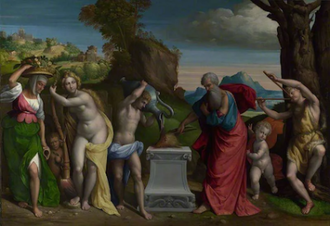Gospel in Art: I desire mercy, and not sacrifice

A Pagan Sacrifice, by Benvenuto Tisi, called Garofalo,1526 © The National Gallery, London
Source: Christian Art
Gospel of 18 July 2025
Matthew 12:1-8
At that time Jesus went through the cornfields on the Sabbath. His disciples were hungry, and they began to pluck ears of corn and to eat. But when the Pharisees saw it, they said to him, 'Look, your disciples are doing what is not lawful to do on the Sabbath.' He said to them, 'Have you not read what David did when he was hungry, and those who were with him: how he entered the house of God and ate the bread of the Presence, which it was not lawful for him to eat nor for those who were with him, but only for the priests? Or have you not read in the Law how on the Sabbath the priests in the Temple profane the Sabbath and are guiltless? I tell you, something greater than the Temple is here. And if you had known what this means, "I desire mercy, and not sacrifice", you would not have condemned the guiltless. For the Son of Man is lord of the Sabbath.'
Reflection on the painting
Jesus' words at the end of today's Gospel are striking: 'I desire mercy, and not sacrifice' - a direct quote from Hosea 6:6. It is more than a call to prioritise love of neighbour over ritual observance. It is a revelation of God's deepest longing: that we come to Him and experience His boundless love. God is not seeking perfection from us, no, He is seeking relationship. He wants our hearts, not hollow gestures. He longs for trust, not performance. He wants presence, not pretence. He desires love that is real, not rituals that are empty.
The kind of sacrifices Jesus rejects are vividly depicted in our canvas by Garofalo painted in 1526. A semi-naked man pours red wine from an amphora over a goat's head on an altar, a clear nod to pagan ritual. To his side, a young woman carries an inverted torch, symbol of death, while an elderly woman balances a basket of fruit upon her head. These acts are superstitious, external gestures lacking any real conversion of heart. These are empty sacrifices, devoid of any true worship or relationship with God.
Yet sacrifice, rightly understood, remains central to our Christian life. God desires authentic sacrifice , not of animals or empty ritual, but of self. To love, to grow, to follow Christ always involves letting go of certain things. To warm a home, we burn fuel; to marry, we leave behind single life; to be healthy, we forego indulgence. So too with the life of grace: we must sacrifice our ego, our comfort, our selfish pleasures, in order to truly grow. In the spiritual life, to gain is to give, and the truest offering we can make is offering our hearts fully to God.
LINKS
Gospel in Art: https://christian.art/
Today's Reflection: https://christian.art/daily-gospel-reading/matthew-12-1-8-2025/


















